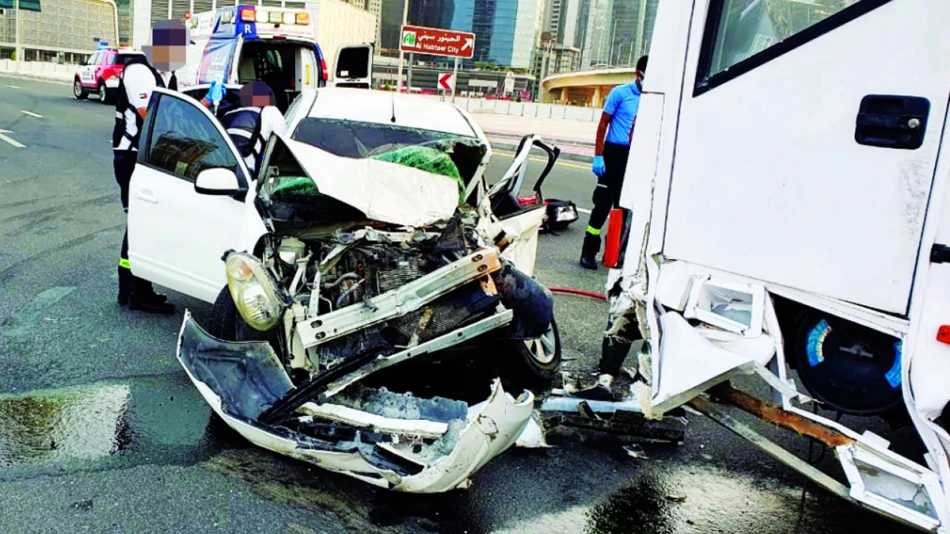
Report Vehicle Accidents Within 3 Hours to Mitigate Consequences
UAE Tightens Traffic Laws with Mandatory 3-Hour Accident Reporting Rule
The United Arab Emirates has implemented stricter traffic regulations requiring drivers to report accidents within three hours of occurrence, cutting the previous six-hour window in half. This legislative shift reflects the country's commitment to reducing road fatalities and improving emergency response times, positioning the UAE as a regional leader in traffic safety innovation.
New Legal Framework Prioritizes Rapid Response
Under the recently enacted Federal Traffic and Transport Law, drivers must notify police or authorized traffic control authorities about any accident through approved channels within three hours, unless there are acceptable reasons for delay as determined by traffic authorities. The law carries significant penalties for non-compliance, including up to one year imprisonment and fines ranging from 50,000 to 100,000 dirhams ($13,600 to $27,200).
Legal consultant Dr. Youssef Al-Sharif emphasized that this obligation extends beyond legal compliance to encompass a crucial humanitarian dimension, particularly in cases involving serious injuries or fatalities where rapid reporting can be decisive in saving lives.
Comprehensive Penalties for Traffic Violations
The legislation addresses multiple scenarios that previously allowed drivers to evade responsibility. Penalties apply to drivers who fail to stop at accident scenes without acceptable excuse, vehicle owners who withhold information about accidents involving their vehicles, those who flee from police during traffic stops, and individuals who intentionally collide with police, military, or security vehicles.
Digital Infrastructure Supports Enforcement
The UAE government has established multiple digital channels for accident reporting, including smart applications from the Ministry of Interior, SAAED, Abu Dhabi Police, Dubai Police, and the Rafid application for Sharjah incidents. This technological infrastructure enables efficient data collection and faster emergency response coordination.
For minor accidents, drivers must move their vehicles to the roadside when possible to avoid traffic disruption, demonstrating the law's dual focus on safety and traffic flow management.
Regional Innovation in Emergency Response Technology
The UAE's approach builds upon its 2018 implementation of an emergency call system (ECALL) for vehicles, making it the first country in the Middle East and North Africa to adopt such technology and only the second globally after the European Union. This system automatically contacts emergency services when accidents occur, transmitting GPS location data, accident time, and vehicle license plate information.
The ECALL system, applied to new vehicle models imported since 2020, can reduce emergency response times by up to 40%, directly correlating with decreased fatality rates and severe injury cases.
Market Impact on Insurance and Automotive Sectors
Insurance expert Bassam Adeeb Jeilmiran, head of the Gulf Insurance Union's technical committee, noted that the reduced reporting timeframe from six to three hours will likely impact insurance claim processing and fraud prevention. The stricter timeline may pressure insurance companies to develop more efficient claim assessment procedures while potentially reducing fraudulent claims through faster documentation requirements.
Acceptable Exceptions Provide Legal Balance
The law recognizes legitimate circumstances that may prevent timely reporting, including physical injuries preventing communication, loss of consciousness or psychological trauma from accidents, communication failures due to network outages or device damage, and accidents occurring in remote areas or during extreme weather conditions.
However, drivers must provide evidence supporting their delay through medical reports, witness testimony, call records, or other documentation to validate their excuse.
Broader Implications for Regional Traffic Safety
This legislative tightening aligns with broader Gulf Cooperation Council efforts to harmonize traffic safety standards and reduce regional road fatality rates. The UAE's approach may serve as a model for neighboring countries seeking to balance individual rights with public safety imperatives.
The integration of advanced technology with strict legal frameworks positions the UAE at the forefront of smart city initiatives, where data-driven governance meets practical safety concerns. This dual approach of technological innovation and legal enforcement creates a comprehensive system that addresses both immediate emergency response needs and long-term behavioral modification among drivers.
The success of this initiative will likely influence similar legislative developments across the region, as governments seek to leverage technology and legal frameworks to create safer transportation environments while maintaining economic efficiency in their rapidly growing urban centers.
Most Viewed News

 Sara Khaled
Sara Khaled






